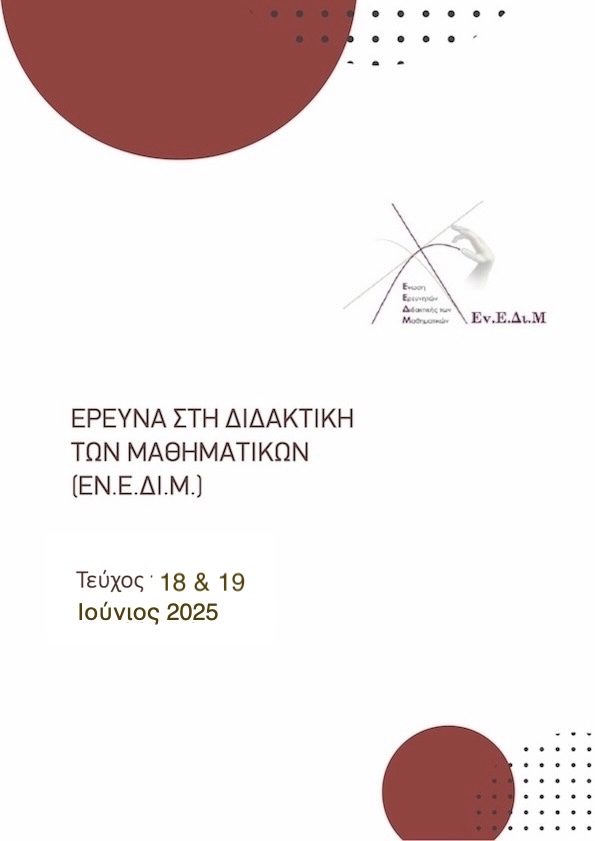ΑΝΤΙΛΗΨΕΙΣ ΕΚΠΑΙΔΕΥΤΙΚΩΝ ΠΟΥ ΔΙΔΑΣΚΟΥΝ ΜΑΘΗΜΑΤΙΚΑ ΣΤΗ ΔΕΥΤΕΡΟΒΑΘΜΙΑ ΕΚΠΑΙΔΕΥΣΗ ΓΙΑ ΤΗΝ ΤΡΕΧΟΥΣΑ ΕΠΑΓΓΕΛΜΑΤΙΚΗ ΤΟΥΣ ΤΑΥΤΟΤΗΤΑ

Δημοσιευμένα:
Jun 26, 2025
Λέξεις-κλειδιά:
τρέχουσα επαγγελματική ταυτότητα, εκπαιδευτικοί, μαθηματικά, δευτεροβάθμια εκπαίδευση
Περίληψη
Η δυναμικά συνιστάμενη φύση της επαγγελματικής ταυτότητας των εκπαιδευτικών που διδάσκουν μαθηματικά στη δευτεροβάθμια εκπαίδευση, μέσα από τη διαμόρφωση νέων πρακτικών ανά χρονική στιγμή και πλαίσιο, φωτίζει, μέσω των αντιλήψεων των ίδιων των εκπαιδευτικών, όψεις της τρέχουσας επαγγελματικής τους ταυτότητας, και πληροφορεί για τον τρόπο, με τον οποίο εκείνη αναπτύσσεται.
Λεπτομέρειες άρθρου
- Πώς να δημιουργήσετε Αναφορές
-
Γεωργαντά Ο. (2025). ΑΝΤΙΛΗΨΕΙΣ ΕΚΠΑΙΔΕΥΤΙΚΩΝ ΠΟΥ ΔΙΔΑΣΚΟΥΝ ΜΑΘΗΜΑΤΙΚΑ ΣΤΗ ΔΕΥΤΕΡΟΒΑΘΜΙΑ ΕΚΠΑΙΔΕΥΣΗ ΓΙΑ ΤΗΝ ΤΡΕΧΟΥΣΑ ΕΠΑΓΓΕΛΜΑΤΙΚΗ ΤΟΥΣ ΤΑΥΤΟΤΗΤΑ. Έρευνα στη Διδακτική των Μαθηματικών, (18 & 19), 51–67. ανακτήθηκε από https://ejournals.epublishing.ekt.gr/index.php/enedim/article/view/36436
- Ενότητα
- Άρθρα

Αυτή η εργασία είναι αδειοδοτημένη υπό το CC Αναφορά Δημιουργού 4.0.
Οι συγγραφείς των άρθρων που δημοσιεύονται στο περιοδικό διατηρούν τα δικαιώματα πνευματικής ιδιοκτησίας επί των άρθρων τους, δίνοντας στο περιοδικό το δικαίωμα της πρώτης δημοσίευσης. Άρθρα που δημοσιεύονται στο περιοδικό διατίθενται με άδεια Creative Commons BY και σύμφωνα με την άδεια μπορούν να χρησιμοποιούνται ελεύθερα, με αναφορά στο/στη συγγραφέα και στην πρώτη δημοσίευση.Λήψεις
Τα δεδομένα λήψης δεν είναι ακόμη διαθέσιμα.
Αναφορές
Andreouli, E. (2010). Identity, positioning and self-other relations. Papers on Social Representations, Vol 19(14), pp.1-13.
Darragh, L. (2014). Asking questions and performing mathematics identity In J. Anderson and M. Cavanagh & A. Prescott (Eds.). Curriculum in focus: Research guided practice (Proceedings of the 37th annual conference of the Mathematics Education Research Group of Australasia) pp. 175-182. Sydney: MERGA.
Darragh, L. (2016). Identity research in mathematics education, Educ Stud Math, Vol 93, pp. 19-33.
Farrelly, C., Schwartz, S., Amodeo, A., Feaster, D., Steinley, D., Meca, A. & Picariello, S. (2017). The analysis of bridging constructs with hierarchical clustering methods: an application to identity, Journal of research in personality, Vol 70, pp.93-106.
Goos, M. & Bennison, A. (2019). A zone theory approach to analyzing identity formation in mathematics education, ZDM, Vol 51, pp. 405-418.
Grootenboer, P. & Edwards-Groves, C. (2019). Learning mathematics as being stirred into mathematical practices: an alternative perspective on identity formation, ZDM, Vol 51, pp. 433-444.
Gutierrez, R. (2013). The Sociopolitical Turn in Mathematics Education, Journal for Research in Mathematics Education, Vol. 44 (1), pp 37-68.
Howarth, C. (2002). Identity in whose eyes?: the role of representations in identity construction. Journal for the theory of social behavior, Vol 32(2), pp. 145-162.
Izadinia, M. (2013). A review of research on student teachers’ professional identity, British Educational Research Journal, Vol. 39 (4), pp.694-713.
Klein, M. (2012). How inconvenient assumptions affect preservice teachers’ uptake of new interactional patterns in mathematics: Analysis and aspiration through a bifocal lens. Educational Studies in Mathematics, 80(1/2), 25–40. doi:10.1007/s10649-012-9390-1
Leatham, K. (2006). Viewing mathematics teachers’ beliefs as sensible systems. Journal of Mathematics Teachers Education, Vol 9, pp. 91-102.
Lutovac, S. & Kaasila, R. (2018). Future directions in research on mathematics-related teacher identity, International Journal of Science and Mathematics Education, Vol 16, pp. 759-776.
Mandt, H. & Afdal, G. (2020). On a math mission: The time and space compression of professional identity and values in prospective mathematics teachers’ stories. European Educational Research Journal, Vol 00 (0), pp.1-17.
Rungson, C. (2010). Quality of psychology test between Likert scale 5 and 6 points. Journal of Social Sciences, Vol. 6(3), pp. 399-403.
Sakonidis, C. (2019). Mathematics teaching and teachers practice: tracing shifts in meaning and identifying potential theoretical lenses. Eleventh Congress of the European Society for Research in Mathematics Education, Utrecht University, Feb 2019, Utrecht, Netherlands. ⟨hal-02430193⟩
Sfard, A. (2019). Making sense of identities as sense - making devices – a commentary. ZDM – Mathematics Education, Vol 51(3), pp. 555-564.
Sfard, A. & Prusac, A. (2005). Telling identities: In search of an analytic tool for investigating learning as a culturally shaping activity, Educational research, Vol 34 (4), pp. 14-22.


